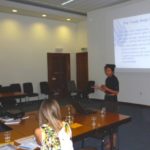This seminar on the right to education aims to strengthen NGO capacity building by fostering a better understanding of the scope of relevant legal provisions in the core international Human Rights Treaties; and providing practical insights to enhance actions vis-à-vis Treaty Bodies.
Education as a Right: CCIG Seminar on Education within the UN System
 On 3 September 2013, CCIG held the Seminar on the Right to Education, with the participation of 12 different organizations interested in educational issues, but also specialized in several fields of expertise, such as women’s rights, children’s rights, migration, social exclusion and development. The seminar was held as a response to a call from members during a previous General Assembly of CCIG, where members asked for the center to undertake initiatives to build upon NGOs’ capacities regarding UN treaty bodies.
On 3 September 2013, CCIG held the Seminar on the Right to Education, with the participation of 12 different organizations interested in educational issues, but also specialized in several fields of expertise, such as women’s rights, children’s rights, migration, social exclusion and development. The seminar was held as a response to a call from members during a previous General Assembly of CCIG, where members asked for the center to undertake initiatives to build upon NGOs’ capacities regarding UN treaty bodies.
The two speakers were Christian Courtis of the Human Rights and Economic and Social Issues Section (OHCHR) and Nosy Ramamonjisoa of the Human Rights Treaty Bodies Division (OHCHR). Mr Courtis spoke about the scope of relevant provisions and indicators on the right to education. Ms Ramamonjisoa presented an overview of the treaty bodies system and spoke about ways in which civil society organizations can contribute in particular to the reporting system of the Committee on Economic, Social and Cultural Rights (CESCR). The intersectional issue was presented from multiple perspectives to give all participants a broader and multifaceted understanding of the right to education and its implementation.
Education as a Right
Mr Courtis’ overview on the right to education covered relevant international legal provisions and clarified the scope and interpretation of such provisions by UN bodies. As an expert in direct implementation of this right, Mr Courtis’ experience gave an insightful perspective for attending NGO representatives. Issues regarding education were discussed such as fundamental education regardless of age, and the delicate transition from primary education to secondary and higher education.
Moreover, availability, accessibility, acceptability, adaptability and other obligations associated with providing and maintaining education were addressed. The inclusion of human rights education in curricula was also mentioned, since basic awareness of human rights can help better ensure effective implementation of the right to education.
Universal Periodic Review (UPR) and Treaty Bodies: “Complementary”
The second part of the seminar was presented by Nosy Ramamonjisoa, whose work with the CESCR provided an opportunity to delve into aspects of the treaty bodies’ functioning, with special attention given to the role of NGOs’ participation. Noting that most of the NGOs attending were already engaged in working with the UPR, Ms Ramamonjisoa emphasized that UPR and treaty bodies are “complementary” and should both be utilized to make as much of a change in the world as possible.
Ms Ramamonjisoa encouraged participants to take the best from both the UPR and the treaty body system to continually strive for efficiency in the implementation of human rights.
The seminar was the most recent materialization of CCIG’s response to support the work of NGOs at the UN while valuing experiences of Human Rights Defenders on the ground. By bridging the gap between the local and international, CCIG hopes to enhance the work of its member organizations and make their actions within the UN system more effective, with the ultimate goal to bring a change for the better in the lives of so many people whose rights, including the right to education, are continuously violated.




